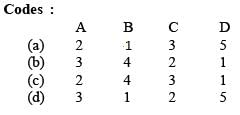Practice Test: Indian Polity - 16 - UPSC MCQ
25 Questions MCQ Test - Practice Test: Indian Polity - 16
Which one of the following statements is correct with reference to the Government of India Act, 1935?
Consider the following statements regarding the composition of the Constituent Assembly:
- The representatives were to be elected from the four constituents : Hindus, Muslims, Sikhs and Christians
- The Chairman of the Union Constituent Com-mittee was Sardar Vallabhbhai Patel
- The total strength of the Constituent Assembly was 389
- The Drafting Committee under the chairmanship of Dr. B.R. Ambedkar consisted of eight members
Which of these is/are correct?
| 1 Crore+ students have signed up on EduRev. Have you? Download the App |
Which of the following Articles of the Indian Constitution deal with Citizenship in India?
The secession of a state from the Indian Union has been barred by the
The Qualifications for the members of Finance Commission
In case of declaration of financial emergency in India,
Match List-I with List-II and select the correct answer :
List-I (Fundamental Right) List-II(Article No.)
Consider the following statements : A bill is reserved, by the Governor of a State for the consideration of the President. The President may
- give his assent to the Bill
- withhold his assent to the Bill
- veto the Bill
- direct the Governor of the State to return it to the House for reconsideration
Which of these are correct?
Consider the following statements :
- All decisions of the Council of Ministers relating to the administration of the Union must be communicated to the President
- The President can call for information relating to proposals for legislation
- The President can direct that any matter on which decision has been taken by a Minister should be placed before the Council of Ministers
- The President has the right to address and send messages to the Council of Ministers to elicit specific information
Which of these is/are correct?
Consider the following statements:
1. The President ca n not function without the Union Council of the Ministers
2. The Solicitor-General is the highest legal authority of the Union Government
3. The Union Council of Ministers can function for sometime even after death or resignation of the Prime Minister
4. In the absence of the Prime Minister, only the Home Minister can preside over emergency meetings of the Union Council of Ministers.
Which of these is/are correct
The issue of whether a commitment made by a Minister on the floor of the House has been fulfilled or not is decided by the
Who among the following decides whether a Bill is a Money Bill?
Match List-I with List-II and select the correct answer :
List-I (Constitutional Amendment) List-II (Effects)

Who among the following appoints the District Judge in a State?
The doctrine of ‘prospective over ruling’ was adopted by the Supreme Court of India in the case of
In which one of the following case has the Supreme Court of India laid down that a citizen can be compensated for loss or injury caused by arbitrary or capricious action by a public authority?
Consider the following statements with regard to Public Interest Litigation :
- In essence, a third party can bring before the courts, issues in the public interests
- The Supreme Court may act on the receipt of a latter or postcard from a citizen requesting protection of his fundamental rights
- It is also known as Social Action Litigation
- Justices V.R. Krishna Iyer and P.N. Bhagwati were its proponents
Which of these are correct
The State Government’s administrative control over municipalities does not include power
Match List-I with List-II and select the correct answer:
Consider the following statements: The Comptroller and Auditor-General of India
- audits all expenditures from the revenues of the Union and the States.
- ensures that total withdrawls by the Union Government do not exceed the amounts approved by the Parliament.
- can comment on correctness or otherwise of financial transactions of the Union and the States.
- point out cases of non-compliance of rules and regulations in expenditure.
Which of these are correct
Consider the following: A budget is always
- a statement of estimated income and expenditure
- either surplus or deficit
- bounded by a time frame
- performance oriented
Which of these is/are correct?
Which one of the following statements is not correct?
Which one of the following governments have enacted Right to Information act in the year 2001 (w.e.f. October 2, 2001)?
Which one of the following statements is not correct about Civil Society Organisations?

















